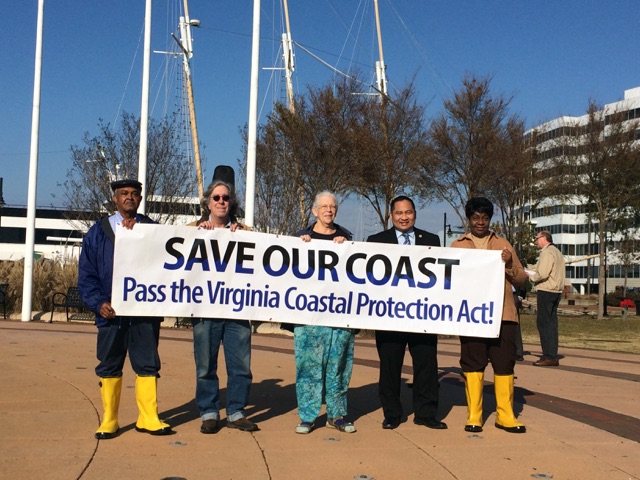We built a movement. Two years ago, CCAN unveiled a new campaign with a singular focus: highlight the urgent need for solutions to flooding and climate change in at-risk areas of Virginia. Over the past two years, CCAN supporters and partnering organizations have advanced our Safe Coast Virginia campaign and turned our top priority legislation, the Virginia Coastal Protection Act (VCPA), into one of the most talked-about climate bills in the state.
We’re not done yet. On Wednesday, the General Assembly convenes for the 2016 legislative session and passage of the VCPA is our main goal. Republican delegate Ron Villanueva and democratic senator Donald McEachin have reintroduced a bill that is badly needed in order to help solve the crisis of flooding in Virginia that is fueled by climate change.
The bill has seen an evolution of late – for the better. In September of last year, Gov. McAuliffe declared a state of emergency for an impending weather event that wreaked havoc in many communities along the east coast – and could’ve been much worse. A McAuliffe administration official said that the severe rain event that caused millions of dollars in damages throughout the commonwealth “was not a coastal event.” Homes in every part of the state were affected by this storm and more homes will be at risk in the future due to climate change.
When this campaign first began, CCAN helped shed light on the significant costs associated with sea level rise along the coast. By now, we all know that the cost to help Hampton Roads adapt to sea level rise is in the billions of dollars. These figures are far too great for localities to bear themselves. What has become increasingly clear is that climate change is fueling severe flooding events throughout the state with more frequency, making communities incredibly vulnerable in every part of the state.
The reintroduced version of the VCPA will provide revenues to localities throughout the state to assist with flooding and climate resilience efforts. I’m proud to have gained the support of the Virginia Municipal League, an organization representing localities throughout the state, who has enthusiastically endorsed the VCPA as a solution to flooding and climate change and will work for its passage. In addition, individual localities from Staunton to Leesburg to Virginia Beach have stepped up to support the VCPA.
There are other bills that we’ll be following this year as well. We’re going to hold legislators accountable for attempts to stall on climate progress by delaying implementation of the Clean Power Plan. We will continue to fight for strengthened clean energy laws and promote the expansion of solar, wind, and efficiency programs as we have successfully done in the past few years. And we will monitor efforts by gas companies to accelerate development of natural gas infrastructure which leads to devastating local and climate impacts.
But one of the biggest challenges facing our lawmakers this session is how to secure the massive amount of resources necessary to begin implementing solutions to sea level rise in Hampton Roads and flooding from severe rain events in localities throughout Virginia. Our elected leaders can take a step forward on climate and begin addressing this problem by passing the VCPA in a few short weeks.
We’ll keep you posted on the VCPA’s progress and other climate-related bills as they make their way through the legislative process in Richmond.
Fredericksburg, Leesburg pass resolutions in support of RGGI
In the final two week of November, the city of Fredericksburg and the town of Leesburg both passed resolutions in support of the Virginia Coastal Protection Act. The votes came on the heels of a number of cities in the Hampton Roads, including Hampton and Virginia Beach, that have also voted to support the bipartisan legislation to allow Virginia to join the Regional Greenhouse Gas Initiative (RGGI).
RGGI is a cooperative effort among nine east state from Maine to Maryland that caps and reduces their emissions from power plants. Under RGGI, power plants in participating states purchase allowances for every ton of carbon pollution that they emit. Virginia could receive as much as $209 million annually from the proceeds from the the allowances, which would be directed towards climate-related flooding mitigation, energy efficiency, renewable, and economic development in southwestern Virginia.
With the General Assembly session just around the corner, momentum is building once again for the Virginia Coastal Protection Act. Last year, the bill narrowly failed to make its way out of the Senate Agriculture, Conservation, and Natural Resources Committee. The bipartisan patrons of last year’s bill, Del. Ron Villanueva (R-Virginia Beach) and Sen. Donald McEachin (D-Richmond), are expected to reintroduce the legislation in the coming weeks.
This time around we’ve built an even broader and more diverse coalition of supporters. Businesses large and small, as well as, housing advocates and social justice organizations are all on board. Scientists are saying that 2015 is well on its way to being the warmest year on record, and we need solutions for coastal Virginia now.
As we approach General Assembly session in January, we will need your help to pass the Virginia Coastal Protection Act. You can find out how to get involved by emailing me at Charlie@chesapeakeclimate.org.

